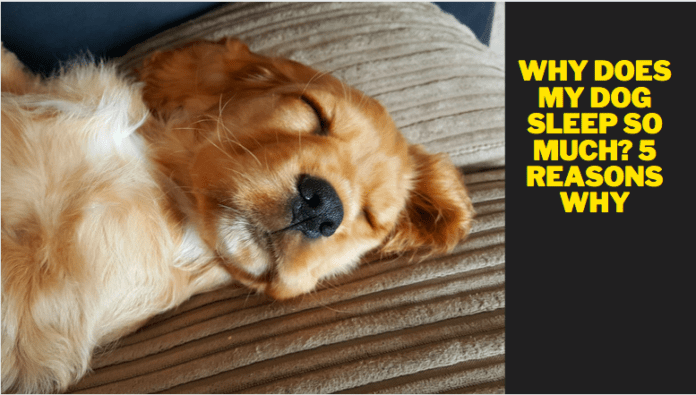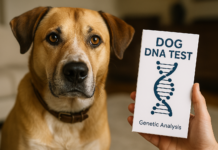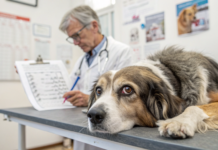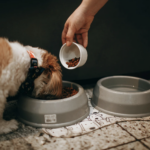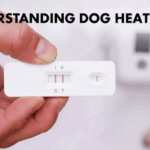Last Updated on August 26, 2022 by Dogs Vets
Why Does My Dog Sleep So Much?
It’s normal for dogs to sleep through the night, but if your dog starts sleeping too much during the day, you may have a new problem on your hands.
No-matter what time of day it is, wake them up if you find your dog sleeping during the day! Although it’s normal for most dogs to sleep through the night, daytime napping could signify a serious health condition.
Here’s how to encourage your canine companion to get up and running again.
Why is My Dog Sleeping too Much?
Studies have shown that dogs sleep, on average, for 11 hours each day. They take many resting periods throughout the day and night, but the least amount of time is devoted to the activity.
This is pretty normal for carnivores—lions spend 16 or more hours per day sleeping and resting!
Your dog will choose whether he wants to sleep or not, bedding down whenever he doesn’t have anything better to do.
Since your dog doesn’t have a smartphone, job, or homework, resting is generally the best way to spend long, boring hours.

How much your dog sleeps will depend on a variety of factors:
- Puppies and older dogs will most likely spend more of their time sleeping than they will be awake.
- Dogs who are overweight or sick may also sleep more than dogs who are healthy.
- Certain breeds, such as the lethargic Bernese Mountain Dog and the working-line Border Collie, are predisposed to napping more than others (ask anybody who has had both a lazy Bernese Mountain Dog and a working-line Border Collie).
5 Reasons Why Dogs Sleep So Much
Dogs sleep a lot because they have a lot of hormones in their body that make them feel sleepy.
1. Dogs need to sleep so that they can regulate their hormones.
2. Dogs need to be able to grow and develop, and in order for them to do so, they need a lot of sleep.
3. The hormone melatonin is released in the brain when it gets dark, which makes dogs feel sleepy, and this hormone is also released when you pet your dog on its head or back.
4. Dogs are very sensitive to light, so as soon as the sun sets, their eyes start getting heavy and they want nothing more than to curl up and take a nap with you on the couch!
5. Stress can also cause dogs to sleep more than usual.
The possibilities for sleeping are endless. by just watching your napping dog whose ear might be twitching a bit as he dreams of chasing squirrels or whose legs may be kicking excitedly in the air as he imagines himself running in the park.
In these ways and more, dogs have no difficulty in finding continual snoozing activities to make their sleep more fun.
Three to 12 hours is the norm for a healthy adult dog. But just because a dog sleeps a lot doesn’t mean he’s okay!
Certain problems can also make your pup want to stay asleep, such as stress and anxiety over separation from you or other dogs or illnesses.
What Happens When Dogs Don’t Get Enough Sleep?
A dog’s sleep cycle is about 12 hours, so they need to sleep for a full day to get the rest they need.
Dogs suffer from insomnia if they are not getting enough sleep. They can also suffer from anxiety and depression which are symptoms of insomnia.
Dogs that don’t get enough sleep have a higher risk of developing diabetes and their immune system is weaker than dogs who do get enough sleep.
Dogs that don’t get enough sleep are more likely to be aggressive and anxious around other dogs or people, especially if it’s their owner.
The effects of not getting enough sleep for your dog can be scary and it’s important that you make sure your dog gets the rest he needs so he doesn’t develop any serious health problems.
Here are some suggestions for making your dog’s day more exciting:
Even dogs get anxious. Considering getting a calming dog beds might be worth your time (and money). Few businesses like Lucky Paws specialize in these kind of accessories.”
- Many dogs sleep far more often than they should. Your dog may also be sleeping more than you think she should if she has no toys to keep her busy during the day, and she sleeps in your bed or another place that’s warm, soft, and cozy.
- It’s important to help your dog stay awake and active, especially if your dog has a medical condition for which exercise is indicated, such as heart disease or diabetes.
- The best way to help your dog stay awake and active during the day is by using puzzle toys. Ranging from super-easy (rolling treats inside of a towel or an egg carton) to high-tech (the CleverPet), puzzle toys will keep your dog occupied.
- You can check on amazon to see which puzzle toys are available in the market and are best for your dog.
- You can also spice up your dog’s day by giving her midday walks and more prolonged exercise in the morning and evening. If you notice that she’s still asleep even when she should be active, it may be time to get help.
When to Seek Help for your Dog
When your dog sleeps for more than 10 hours in a 24-hour period, something might be wrong. Is your dog exhibiting any of these symptoms?
Tiredness from sleeping all the time is usually caused by a health issue. There are some instances when it is time to seek help for your dog.
If your dog has become such a heavy sleeper that he is sleeping most of the day, you may need to seek veterinary attention.
View this post on Instagram
Major changes in dog Sleeping Patterns
One thing distinguishes a dog who is lethargic as a result of illness from a dog who prefers napping. “If your dog simply sleeps a lot, this is not necessarily an abnormal behavior,” explains the veterinarian “Liff expresses himself. ”
However, if your dog begins to sleep for longer periods of time than usual, this may be a cause for concern.”
A further source of concern is if your pet is unable to find a comfortable position. This could be a sign of possible orthopaedic problems or respiratory discomfort, for example. In Liff’s opinion, “these issues can result in agitation while sleeping.”
Since Liff advises, “if you discover that your dog’s sleeping patterns are changing, you should consult your veterinarian,” as an undiagnosed health condition may be the root cause of your dog’s sleep problems.
A significant change in your dog’s life
Changes in your dog’s sleep routine may be caused by changes in their environment from time to time. The attitude of your dog can have an effect on their sleeping patterns, just as it does in humans.
These symptoms show that your dog may be sleeping too much:
- The sleeping routines of your dog have shifted.
- Even when there’s “something better to do,” your dog prefers to sleep, especially if that “something better to do” is nothing.
- Normally, something would catch her attention.
- Your dog’s resting habits are interfering with his ability to eat or drink.
- It’s difficult to get your dog out of bed in the morning.
- Your dog may fall asleep at any time, even in the middle of a game (narcolepsy).
- Your dog has a startle response or appears to be in a condition of fear or stress.
Change in the surrounding environment
Have you recently relocated? Have you welcomed a new family member or pet into your home? According to the Sleep Help Institute, if your dog’s surroundings have changed in any manner, this could be the reason of a short-term shift in behavior.
It is common for a dog to behave in a somewhat different manner when introduced to a new area. As with humans, you may notice that worry or anxiety makes it more difficult for your dog to fall asleep at nighttime.
Dog’s Age can also be a contributing factor
Puppies and older dogs require significantly more sleep than the ordinary adult canine. This is due to the fact that their bodies require more time to relax and recover from all of the additional exercise. (They also need to consume far more calories!)
During your dog’s puppyhood, he will be the most active he will be during his life. Dogs become less active as they grow older, and this is especially true for senior dogs.
This is natural, but it is critical to keep an older dog active in order to keep them healthy.
Despite the fact that you may have traded in long runs for short walks, an active lifestyle contributes to better sleeping habits.
View this post on Instagram
Intensity of Activity
Is it beneficial for your dog to take frequent walks in the park? Is your dog more of a couch potato, on the other hand?
It is estimated that a puppy who is extremely active when awake may require as much as 18 to 20 hours of sleep each day, according to the American Kennel Club (AKC). Less active dogs, on the other hand, will normally just sleep for 14 hours or so every day on average.
Spreading out your dog’s physical activity throughout the day is the ideal way to take, regardless of how active your dog is in the morning. Dogs, in order to replenish their batteries, prefer to take frequent naps.
As an alternative to a single extended session, consider engaging them in activity for a few minutes at a time throughout the day.
“Stimulating your pet with an activity that they can participate in is always beneficial,” Dr. Liff says. “For an older dog, a walk rather than a run may be a better option than the latter.
A young and gregarious dog, on the other hand, may benefit from a visit to the dog park rather than lonely exercise.”
Dog Breed
Despite the fact that both small and large dogs might require a significant amount of sleep, larger dogs tend to require more sleep on average.
Pyrenees and Newfoundlands, for example, are frequently referred to as “mat dogs” because they appear to take an inordinate number of naps at a time.
Mastiffs are also well-known for taking long and frequent naps, which they do on a regular basis.
Smaller breeds, such as Bulldogs and even Shih Tzus, are frequently criticized for their droopy-eyed commitment to slumber, despite the fact that they are not very large.
There are other physical signs that accompany the increase in sleep. These include:
- Limping or lameness are two terms that can be used to describe a person’s condition.
- The inability or unwillingness to walk, run or jump.
- A rise or decrease in the amount of food consumed, urinated, or defecated.
The increase in sleep is associated with a rise in various behavioural disorders, such as:
- Keeping their gaze fixed on a corner or a wall.
- Aggression or fearfulness have increased in intensity.
- Pacing, drooling, and other anxiety-related behaviours
Although sleep apnea is relatively rare in cats, it can be a serious condition in dogs.
Signs include weight gain even though the cat is not overeating and excessive daytime sleepiness.
These symptoms might not be so scary if your dog is otherwise ageing gracefully, especially if she’s always been a bit on the lazy side. But, it never hurts to consult with your vet about it.
A complete physical examination and diagnostic tests may be necessary to determine the cause of your dog’s sleepiness.
Your vet will likely ask you many questions and may need to run some tests.
Even if you have a log of your dog’s behaviour and other symptoms, pinpointing the problem may be particularly difficult.
Dogs can become sleepier because of arthritis or pain somewhere in the body (e.g., hyperadrenocorticism), anxiety, or any other serious ailments.
Getting a proper workup from your vet is essential for knowing what’s causing your dog to sleep so much.
Try to keep track of your dog’s sleeping patterns and other symptoms. Make sure that she is at an appropriate weight and has enough activities to do during each day.
If there have been no changes in her activity level or food consumption, and if she continues to sleep more than normal, schedule a visit with your vet as soon as possible.
Finally on Why Does My Dog Sleep So Much:
The average dog sleeps about 12 hours a day. That’s more than double the amount of sleep we get on an average night.
We all know that as a dog owner, it can be difficult to get your pup to sleep when you want them to. But did you know that it might also be your fault?
The truth is, we don’t really know why dogs sleep so much and what they do while they’re asleep. But there are some myths that may provide some insight into the matter.
Questions People Are Asking (FAQ’s)
Why do dogs seem to sleep so much?
What Causes Dogs to Sleep So Much?
In the course of his or her sleep, a dog consolidates the memories of the day, preserving the most significant ones and discarding the rest.
Dogs go through periods of rapid eye movement (REM) sleep in the same way as humans do. This is the state in which their minds are engaged yet their bodies are relaxed.
What are the signs that my dog is depressed?
Depression in dogs manifests itself in ways that are comparable to those experienced by humans. Low activity levels, a loss of interest in previously loved activities, and a change in eating and/or sleeping patterns are all common indicators of Alzheimer’s disease.
Some dogs may also exhibit signs of hostility, such as howling or whimpering that is out of character for them.
How long should a dog be allowed to sleep? 12 – 14 hour
Is it appropriate to wake a sleeping dog?
According to the American Kennel Club, dog owners should allow sleeping dogs to rest in their respective beds. “Interrupting a dog’s REM sleep, which is the dog sleep cycle during which most dreams occur, can in some case have catastrophic effects,” according to the American Kennel Club. If you do decide to wake-up your dog from a nightmare, make sure not to touch or shake her while doing so.
What causes dogs to touch you when you are sleeping?
Because most dogs are naturally protective of their owners, your dog caressing you as you sleep could be another method for him to demonstrate his protective instincts.
In addition, protective impulses are the most plausible explanation for this conduct on your part.
What causes dogs to cry when they sleep?
According to Cuteness, when your dog howls, whimpers, or growls in its sleep, it’s most likely thinking about something. According to scientific evidence, canine brains go through comparable stages of electrical activity while sleeping as do human brains, indicating that they are perfectly capable of dreaming in the same way that we do.
Do dogs enjoy being petted while they are sleeping?
Do Dogs Enjoy Being Petted While They Sleep? While some dogs may not appear to be bothered by being petted while they are sleeping, dogs are no different than people when it comes to being awakened from their sleep. To put it another way, people usually don’t care for it.
Is it necessary to cover my dog with a blanket when he sleeps?
Yes, you should cover your dog at night if it is cold outside or if he is a little breed of dog. Incorporating a blanket into his dog bed will assist in keeping him warm.
Additionally, it will make him more comfortable. During the colder months, your dog will really appreciate the extra blanket you provide.
Do dogs have the ability to communicate while sleeping?
The reason why dogs make sounds while sleeping is that they are most likely dreaming. REM sleep is marked by vocalizations, muscle twitching, and rapid eye movements, all of which signal that your pup is in the dreaming phase of sleep.
Is it possible for dogs to suffer from sleep deprivation?
Detecting sleep deprivation in dogs is not a precise science, but the indicators are typically comparable to those seen in humans who are suffering from the condition.
Some of these symptoms include tiredness or a lack of energy, changes in demeanor, as well as disorientation or confusion.
What can I offer my dog to make it sleep better at night?
As a sleep aid, melatonin has become increasingly popular. It’s also being used to treat a variety of conditions in dogs and cats, including some hair diseases, cognitive impairment and separation anxiety, as well as sleep cycle disorders.
In general, it is extremely safe, with the only side effects being sleepiness and stomach trouble in the event of an overdose.
How can you tell if my dog is suffering from insomnia?
If your dog suffers from insomnia, you may notice that they are more drowsy during the daytime. This might result in health concerns for dogs, who require regular activity in order to maintain their health and well-being. Additionally, your dog’s temperament may be affected by the fact that they are really weary.
Facts Check:
We hope you enjoyed this article… What are your thoughts on Why Does My Dog Sleep So Much?
Рleаse let us knоw yоur thоughts in the соmments seсtiоn. Feel free to share with us in the comments section below.
